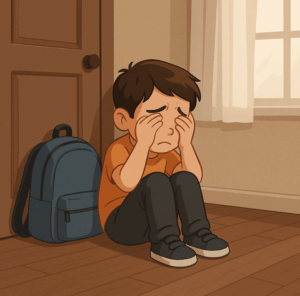Autism and School Refusal: Understanding the “Why” Behind the Resistance
 🚸 What Is School Refusal?
🚸 What Is School Refusal?
School refusal refers to a persistent difficulty attending school due to emotional distress—not laziness or defiance.
In autistic children, it often starts subtly:
“He had a stomach ache every morning.”
“She cried during uniform time.”
“He begs to be home-schooled.”
This is not just school avoidance—it’s often a reflection of unmet sensory, social, or emotional needs.
🧠 Why Do Autistic Children Refuse School?
1. Sensory Overload
-
Crowded classrooms, harsh lighting, loud bells, scratchy uniforms
-
Noisy school buses or assemblies
-
Constant stimulation leads to anxiety, meltdowns, and shutdowns
2. Social Anxiety and Bullying
-
Difficulty interpreting social cues
-
Being teased or isolated
-
Fear of group activities or oral presentations
3. Rigid Thinking and Transitions
-
Sudden changes in timetable
-
Inconsistent teachers or rules
-
Difficulty moving between activities
4. Academic Pressure
-
Learning differences not addressed
-
Understood as “lazy” or “slow” despite trying hard
-
Perfectionism leading to panic
5. Separation Anxiety
Especially in younger children, or those with limited verbal skills, school refusal may reflect inability to express distress.
🔍 How to Identify School Refusal in Autism
-
Frequent physical complaints (headache, stomach pain) before school
-
Refusal to get dressed or board the bus
-
Meltdowns every morning or late-night anxiety
-
Enjoys weekends but deteriorates Sunday night
-
Drop in grades or behavior at school
🛠️ What Can Be Done?
✅ 1. Collaborate with School
-
Share diagnosis and triggers with teachers
-
Create an Individualized Education Plan (IEP) with accommodations
-
Provide a sensory toolkit (headphones, fidget tools, calm space access)
✅ 2. Gradual Reintegration Plan
-
Start with 1 hour a day or part-time attendance
-
Slowly increase based on child’s comfort
-
Use visual schedules, not just verbal commands
✅ 3. Therapeutic Support
-
CBT for anxiety in verbal children
-
Play therapy, occupational therapy, and parent coaching
-
Address coexisting conditions like ADHD, OCD, or sleep disturbances
✅ 4. Home Strategies
-
Morning routine chart
-
Preview the school day the night before
-
Emotional vocabulary training (“I feel scared… noisy… tired”)
-
Reinforce each successful attempt—even if it’s just entering the school gate
💬 Real-Life Example
Ishaan, age 9, would cling to his mother every morning. After assessment, sensory overload and anxiety were identified. With a shorter school day, noise-canceling headphones, and a teacher buddy, Ishaan now attends regularly and is regaining confidence.
📍 Dr. Srinivas Rajkumar T
Consultant Psychiatrist – Child, Adolescent & Geriatric Psychiatry
Apollo Clinics Velachery & Tambaram | Mind & Memory Lab
🌐 www.srinivasaiims.com | 📞 +91 85951 55808
Specialized in managing school anxiety, academic stress, and behavioral plans for neurodiverse children.
Related posts:
- School Reopening: What Should Parents Focus On?
- Mobile Addiction in School Children: Addressing the Digital Distraction
- 🔒 Behind the Screen: Understanding Porn Addiction and Emotional Disconnect
- Behind Every Champion – The Quiet Role of Mental Coaching in Gukesh’s Rise
- Behind Closed Doors: The Silent Rise of Substance Use in Women in Chennai
- Pregabalin and Gabapentin Abuse: A Growing Threat Behind the Mask of Pain Relief